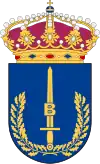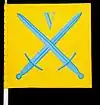Bergslagen Military District
Bergslagen Military District (Swedish: Bergslagens militärområde, Milo B), originally V Military District (Swedish: V. militärområdet) was a Swedish military district, a command of the Swedish Armed Forces that had operational control over the informal Bergslagen region, for most time of its existence corresponding to the area covered by the counties of Värmland, Örebro and Kopparberg (now Dalarna County). The headquarters of Milo B were located in Karlstad.
| Bergslagen Military District | |
|---|---|
| Bergslagens militärområde | |
 | |
| Active | 1942–1991 |
| Country | |
| Allegiance | Swedish Armed Forces |
| Branch | Multi (Sea, Air and Land) |
| Type | Military district |
| Role | Operational, territorial and tactical operations |
| Size | 5 brigades |
| Garrison/HQ | Karlstad |
| Insignia | |
| Command flag |  |
History
Milo B was created in 1966 along with five other military districts as part of a reorganisation of the administrative divisions of the Swedish Armed Forces. It can be seen as the successor of V Military District (V. militärområdet) created in 1942, but that did not have the same tasks as Milo B. The military district consisted of the land covered by the above-mentioned counties. In 1991, the number of military districts of Sweden was decreased to five, and as a consequence of that, Milo B was merged with Eastern Military District (Milo Ö) to create a new military district, Middle Military Area (Milo M).
Units 1989
In peacetime the Bergslagen Military District consisted of the following units, which were training recruits for wartime units:
- Bergslagen Military District (Milo B), in Karlstad
- I 2/Fo 52 – Värmland Regiment / Värmland Defense District, in Karlstad
- I 3/Fo 51 – Life Regiment Grenadiers / Örebro Defense District, in Örebro
- I 13/Fo 53 – Dalarna Regiment / Kopparberg Defense District, in Falun
- A 9 – Bergslagen Artillery Regiment, in Kristinehamn
- ArtSS - Artillery School Training Center, in Älvdalen
In wartime the Bergslagen Military District would have activated the following major land units, as well as a host of smaller units:
- IB 2 - Värmland Brigade, in Karlstad, a Type 77 infantry brigade based on the I 2 - Värmland Regiment
- IB 3 - Life Brigade, in Örebro, a Type 66M infantry brigade based on the I 3 - Life Regiment Grenadiers
- NB 13 - Dalarna Brigade, in Falun, a Type 85 Norrland Brigade (optimized for arctic/winter warfare) based on the I 13 - Dalarna Regiment
- IB 33 - Närke Brigade, in Örebro, a Type 77 infantry brigade based on the I 3 - Life Regiment Grenadiers
- IB 43 - Kopparberg Brigade, in Falun, a Type 66M infantry brigade based on the I 13 - Dalarna Regiment
Heraldry and traditions
Commanding officers
Military commanders
- 1942–1944: Axel Rappe
- 1945–1947: Axel Bredberg
- 1944–1945: Bertil Uggla (acting)
- 1945–1947: Sven Salander (acting[2])
- 1947–1959: Sven Salander
- 1959–1966: Regner Leuhusen
- 1966–1967: Stig Synnergren
- 1967–1973: Stig Löfgren
- 1973–1979: Sigmund Ahnfelt
- 1979–1983: Gösta Hökmark
- 1983–1991: Bengt Tamfeldt
Deputy military commanders
- 1942–1944: Anders Bergquist
- 1945–1951: Harald Hægermark
Chiefs of Staff
- 1942–1944: Gustav Åkerman
- 1944–1949: Börje Furtenbach
- 1949–1954: Sten Langéen
- 1954–1960: Allan Månsson
- 1960–1963: Bo Sandmark
- 1963–1966: Åke Lundberg
- 1966–1968: Karl Eric Holm
- 1966–1968: Gunnar Nordlöf (acting)
- 1968–1972: Gunnar Nordlöf
- 1972–1974: Karl-Gösta Lundmark
- 1974–1984: Sven Werner
- 1984–1986: Percurt Green
- 1986–1987: Bertel Österdahl
- 1987–1989: Lars-Olof Strandberg
- 1989–1990: Bernt Östh
- 1990–1991: Vacant[3]
Names, designations and locations
| Name | Translation | From | To | |
|---|---|---|---|---|
| V. militärområdet | V Military District | 1942-10-01 | – | 1966-09-30 |
| Bergslagens militärområdet | Bergslagen Military District | 1966-10-01 | – | 1991-06-30 |
| Designation | From | To | ||
| V. Milo | 1942-10-01 | – | 1966-09-30 | |
| Milo B | 1966-10-01 | – | 1991-06-30 | |
| Location | From | To | ||
| Stockholm Garrison | 1942-07-06 | – | 1942-09-30 | |
| Karlstad Garrison | 1942-10-01 | – | 1991-06-30 |
See also
References
Notes
- Braunstein 2006, p. 16
- "Två nya generaler". Dagens Nyheter (in Swedish). 16 November 1945. p. 12A. Retrieved 6 May 2020.
- Spiegelberg 1991, p. 383
Print
- Braunstein, Christian (2006). Heraldiska vapen inom det svenska försvaret [Heraldry of the Swedish Armed Forces] (PDF). Skrift / Statens försvarshistoriska museer, 1101-7023 ; 9 (in Swedish). Stockholm: Statens försvarshistoriska museer. ISBN 91-971584-9-6. SELIBR 10099224. Archived from the original (PDF) on 2018-11-25. Retrieved 2019-01-30.
- Holmberg, Björn (1993). Arméns regementen, skolor och staber: [en uppslagsbok] : en sammanställning (in Swedish). Arvidsjaur: Svenskt militärhistoriskt bibliotek (SMB). ISBN 91-972209-0-6. SELIBR 7796532.
- Spiegelberg, Christina, ed. (1991). Sveriges statskalender 1991 (PDF) (in Swedish). Stockholm: Fritzes offentliga publikationer. ISBN 9138125277. SELIBR 3682770.
Web
- Kjelldorff, Lennart (2001). "Försvarets utveckling från Gustav Wasa till vår tid" (PDF). Försvarets Historiska Telesamlingar. Archived from the original (PDF) on 2011-07-22. Retrieved 2007-01-12.
Further reading
- Gustafsson, Kjell, ed. (1991). Bergslagens militärområde, Milo B, 1942-1991: en minnesbok (in Swedish). Karlstad: Milo B. SELIBR 1285430.